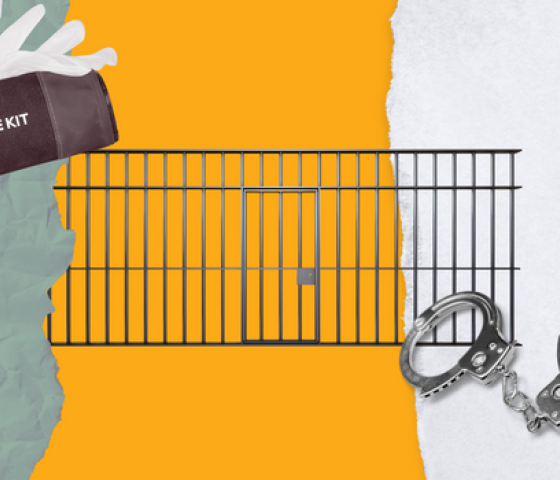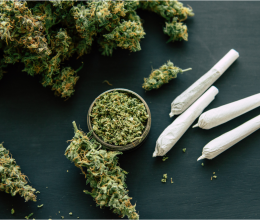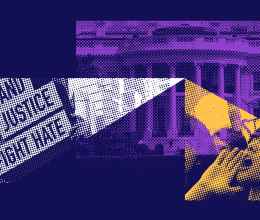According to data from the U.S. Centers for Disease Control and Prevention, over 109,000 overdose deaths took place in 2022, with the New Jersey Office of the Chief Medical Examiner indicating that 2,892 of those overdose deaths are suspected to have occurred in New Jersey. As these figures continue to tragically soar, the true human cost is immeasurable – and each of these deaths could have been prevented by public policies that prioritize saving lives over punishment.
How has criminalization created the overdose death crisis?
Drug criminalization policies are harmful for humanity – laws based in fear and racism have perpetuated targeted over-policing for more than a century. Now, more than ever, it is clear that we must adopt policies that prioritize public health and saving lives.
The United States has had punitive drug policies in place – starting with laws targeting immigrants and Black people – since the late 1800s. Targeted drug criminalization continued through the drug war, which began in the 1970s and persists today, and was devised to control and criminalize Black and brown communities and anti-war protesters.
The current overdose death crisis is a direct result of these penalties criminalizing drugs and people who use and sell them. A June 2023 study examining overdose data after opioid-related law enforcement seizures found that law enforcement activity to interrupt local drug markets was significantly associated with a spike in overdoses in the surrounding area.
Public health approaches require investment in community-based resources
Research has shown that drug criminalization and incarceration is ineffective at preventing overdose deaths or reducing drug use or sale – but despite this evidence, New Jersey continues to spend exorbitant amounts on drug law enforcement at the expense of proven community-based responses.
Between 2010-2019, New Jersey spent over $1.2 billion annually on policing, prosecution, and incarceration stemming from criminalization, far exceeding its investment in evidence-based public health and harm reduction that are proven to prevent overdose and provide individuals with further linkages to care. In 2019, New Jersey’s spending on drug enforcement was 8.5 times higher than its spending on addiction services and 27.9 times higher than its spending on rental assistance, homeless shelters, homelessness prevention, and lead abatement combined.
The failure of drug war spending and disinvestment in community-centered resources is clear. Between 2010-2019, nearly 20,000 New Jerseyans died as a result of drug overdose. And both the overdose death rate and racial disparities only worsened over time. Over the course of a decade, the overdose death rate increased 2.1 times for white people, 3.6 times for Black people, and 3.8 times for Latinx/Hispanic people in New Jersey.
Wholesale departure from punitive policies is mandatory for overdose prevention measures to succeed
Even though New Jersey has begun to invest more in harm reduction and other public health interventions, our progress is undermined by the overarching reliance on criminalization. Criminalization deters individuals from accessing harm reduction and other services that can help to prevent overdose and allow for safer use. The life-saving potential of harm reduction and other public health programs will not be fully realized as long as the ever-present threat of criminal consequences and the civil system consequences that stem from them – like loss of public housing, involvement with the family regulation system, and immigration detention – persist.
Earlier this year, New Jersey lawmakers introduced legislation to increase penalties for fentanyl use or sale. Given the prevalence of fentanyl in the illicit drug supply, this legislation would more harshly punish people for drug violations that are already criminalized under the law. If signed into law, most people who use and/or sell drugs would be charged with a first-degree crime and subject to 10-20 years in prison and hefty fines. In practice, that means people will often be punished for both charges, as many people turn to selling to finance their use. Moreover, when left to police discretion, data show that Black and Latinx New Jerseyans are more likely to be charged with selling – and given harsher consequences than white people – despite the fact that white people in New Jersey both use and sell drugs at higher rates.
In the face of public policy that would allow the State to increase the criminalization and incarceration of people who use drugs, we must be realistic about how such punitive policies limit the impact of evidence-based public health efforts.
What alternative approaches should New Jersey embrace?
Decriminalize all drugs:
Ending criminal penalties for drug use is an essential step to stopping overdose deaths in New Jersey and around the country. New Jersey should follow in the footsteps of Oregon, where Measure 110 was implemented to decriminalize drugs and create a more robust public health system to support people who use drugs. So far, over $302 million has been disbursed to overdose prevention, housing, peer support, harm reduction, treatment and recovery, and other services. Data from the Oregon Health Authority show that: More than 10,100 people received overdose prevention and more than 7,600 people received peer support services to help with recovery.
Unfortunately, there is already legislation pending in the New Jersey Legislature to increase drug penalties. If we truly want to end the overdose death crisis, it is essential that the State invest in harm reduction alternatives rather than the same approach that has led to overdose deaths and the mass criminalization of Black and Latinx New Jerseyans.
Invest in harm reduction infrastructure:
Despite the fact that New Jersey is home to over nine million people, there are currently only seven syringe access programs active in the state, resulting in immense unmet harm reduction needs across the state. Syringe access programs provide harm reduction resources to people who use drugs, ensuring that people have access to medical supplies like sterile syringes and naloxone, an opioid overdose reversal drug. They also provide further links to care, including help accessing drug treatment for those who have requested it. With the passage of the 2022 syringe access expansion law, it is essential that the State and municipalities work together to ensure that all New Jerseyans can easily access life-saving harm reduction services through both place-based programs and other models that increase availability and access.
Moreover, as New Jersey decides on how $641 in opioid settlement funds are used to combat overdose deaths, it is essential that all funds are used to increase funding for or create new non-punitive approaches to support people who use drugs.
Tell your lawmakers that it’s long past time for New Jersey to shift its approach to drug use from criminalization to public health. As we honor and remember the memories of far too many New Jerseyans who have lost their lives due to drug criminalization and overdose, we must ensure that we commit to evidence-based policy solutions that keep our communities healthy and safe.






